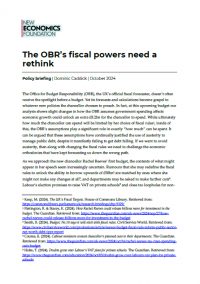Publications The OBR’s fiscal powers need a rethink Outdated fiscal assumptions are limiting the chancellor’s spending power by £8bn a year By Dominic Caddick 28 October 2024 Download the report The Office for Budget Responsibility (OBR), the UK’s official fiscal forecaster, doesn’t often receive the spotlight before a budget. Yet its forecasts and calculations become gospel to whatever new policies the chancellor chooses to preach. In fact, at this upcoming budget our analysis shows
Topics:
New Economics Foundation considers the following as important:
This could be interesting, too:
Robert Vienneau writes Austrian Capital Theory And Triple-Switching In The Corn-Tractor Model
Mike Norman writes The Accursed Tariffs — NeilW
Mike Norman writes IRS has agreed to share migrants’ tax information with ICE
Mike Norman writes Trump’s “Liberation Day”: Another PR Gag, or Global Reorientation Turning Point? — Simplicius
The OBR’s fiscal powers need a rethink
Outdated fiscal assumptions are limiting the chancellor’s spending power by £8bn a year
28 October 2024
The Office for Budget Responsibility (OBR), the UK’s official fiscal forecaster, doesn’t often receive the spotlight before a budget. Yet its forecasts and calculations become gospel to whatever new policies the chancellor chooses to preach. In fact, at this upcoming budget our analysis shows slight changes in how the OBR assumes government spending affects economic growth could unlock an extra £8.2bn for the chancellor to spend. While ultimately how much the chancellor can spend will be limited by her choice of fiscal rules, inside of this, the OBR’s assumptions play a significant role in exactly “how much” can be spent. It can be argued that these assumptions have continually justified the use of austerity to manage public debt, despite it manifestly failing to get debt falling. If we want to avoid austerity, then along with changing the fiscal rules we need to challenge the economic orthodoxies that have kept forecasting us down the wrong path.
As we approach the new chancellor Rachel Reeves’ first budget, the contents of what might appear in her speech seem increasingly uncertain. Rumours that she may redefine the fiscal rules to unlock the ability to borrow upwards of £50bn are matched by ones where she might not make any changes at all, and departments may be asked to make further cuts. Labour’s election promises to raise VAT on private schools and close tax loopholes for non-domiciled residents and private equity firms may be scrapped while commitments to raise capital gains and inheritance tax are gaining traction.
A key source of this uncertainty may be the OBR, whose forecasts will decide if Reeves meets her fiscal rules or not. While much speculation is given to the policy contents of the budget, little attention is given to how the OBR might judge these policies to have effects on growth. Yet, how policies are “scored” by the OBR may decide whether they end up getting adopted. As we detail in this briefing, the default assumptions the OBR applies to policies suggest government spending has no effect after five years, exactly when the fiscal rules bind. The implication of this is governments have often opted to cut budgets expecting debt-to-GDP to fall, without realising that these cuts may affect GDP down the line. Not only are the fiscal rules arbitrary constraints of what we can spend, but the assumptions the OBR make further restrict what we are allowed to spend on within that envelope. As we detail in this briefing, those assumptions directly influence how much the chancellor may allow herself to spend, and we should question if the OBR is appropriately using this power.
Image: The chancellor attends a business reception, Number 10
Topics Macroeconomics




